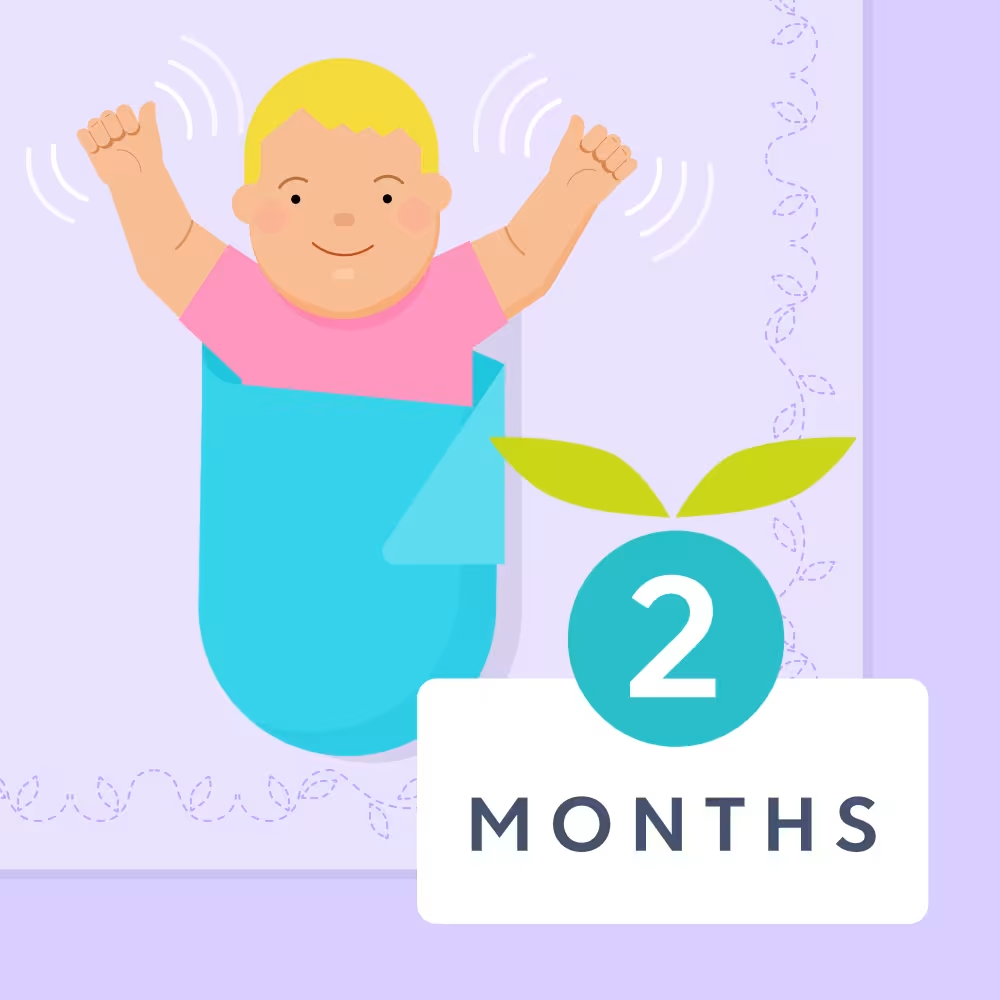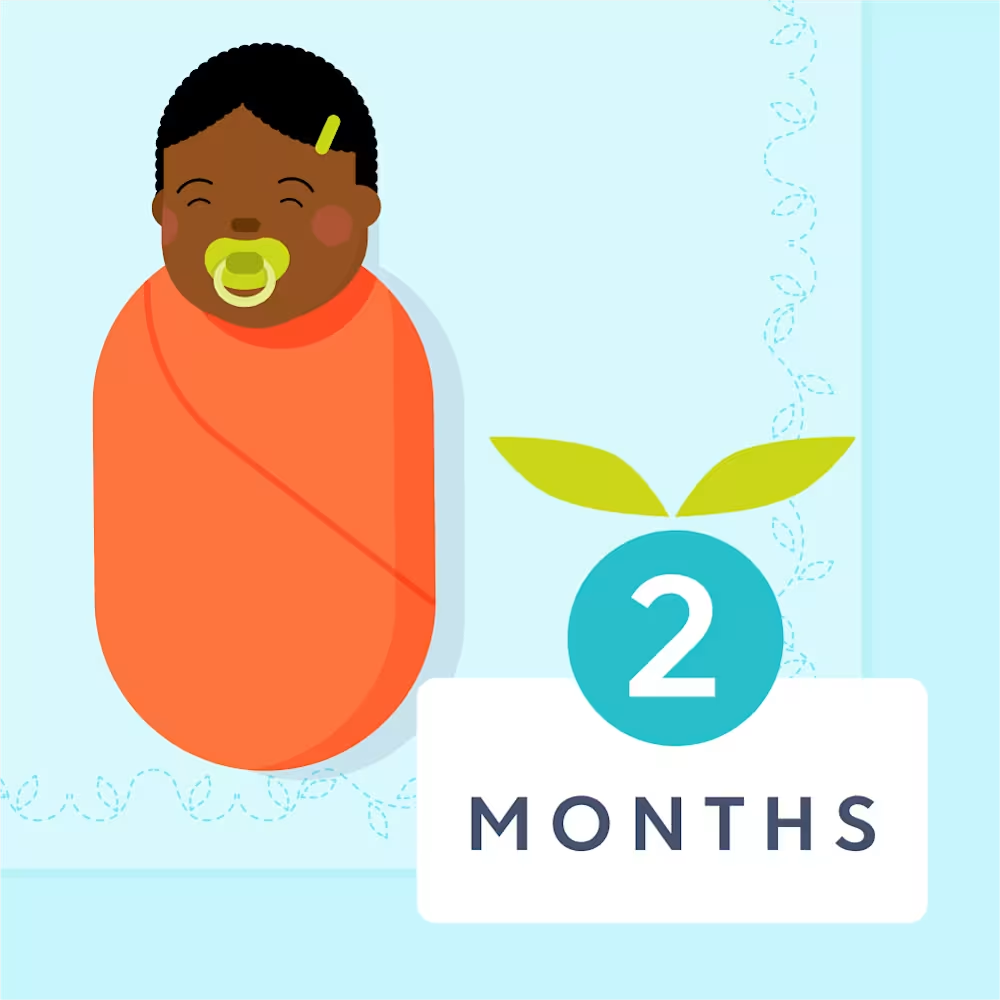Why your newborn isn’t sleeping at night
Updated Oct 16, 2025

Newborn sleep is often a wild ride full of tiny yawns, middle-of-the-night feedings, and a whole lot of unpredictability. If it feels like your baby isn’t sleeping at night or it seems like their days and nights are flipped, rest assured that this is common (and temporary!). Newborns are still adjusting to life outside the womb and their sleep patterns are often all over the map in the early weeks.
In this article, we’ll walk you through the most common reasons your newborn may be wide awake at night, when sleep tends to get more predictable, and what steps you can take to help your baby get more rest in this tender phase of life.
6 common reasons newborns don’t sleep at night
Newborns can be extra wakeful for all kinds of reasons, from hunger to overstimulation to growing pains. Understanding what’s behind your baby’s chaotic sleep can help you respond more calmly and support better sleep for everyone.
1. Hunger and frequent feeding
Newborns wake often during the night . Their stomachs are small and empty quickly, especially during those early weeks of rapid growth. Night feedings are biologically normal and developmentally appropriate — even if they leave you feeling like a 24/7 diner []! Most babies will wake every few hours to feed, whether they’re breastfed or bottle-fed.
Signs to look for:
Your baby wakes every 2 - 3 hours overnight to feed
They’re feeding at least 8 -12 times per day
They root, suck on their hands, or show other hunger cues when waking
Steps to take:
Feed responsively and on demand: Most newborns need to , sometimes more frequently overnight.
Don’t rush to night wean: Waking to feed is normal and expected for newborns and young babies.
Keep nighttime calm: Try to feed in a quiet, dimly lit space to help your baby settle back to sleep afterward.
Talk to your pediatrician: If your baby isn’t back to birth weight by 2 weeks or is feeding less than expected, check in with their medical provider to rule out any concerns.
2. Your newborn can’t tell night from day
Newborn sleep is typically evenly distributed between day and night due to an immature circadian sleep-wake system. This may also lead to babies confusing , meaning they want to be wide awake at night and snooze through daylight hours.
Signs to look for:
Your baby naps for longer stretches during the day and wants to be awake more between sleep cycles overnight
They seem alert, active, or ready to play in the middle of the night
They feed well in daylight, but are fussy or unsettled overnight
Steps to take:
Maximize daytime environmental cues: Let in plenty of natural light, embrace household noise, and don’t stress about daytime naps occurring in lively spaces.
Tone down nighttime vibes: For overnight wake-ups for feeding or changing, keep lights low, voices soft, and activities limited to the bare essentials.
Avoid overtiredness: Monitor your newborn’s (typically 30 - 90 minutes), as overtired babies may struggle to fall asleep and stay asleep.
Try capping individual naps: Consider limiting each nap to about 2 hours to help your baby get enough daytime nutrition and nighttime rest.
Know it won’t last forever: This phase typically resolves by 8 weeks as your newborn’s sleep rhythms mature.
3. The “witching hour”
Some newborns hit a stretch in the evening — usually between 5 - 8 PM — where nothing seems to help them settle. This period, often called the is a normal and exhausting phase marked by increased fussiness, wakefulness, and frequent crying. It may interfere with overnight sleep, especially if a baby becomes overtired during this stretch.
Overstimulation, , overtiredness, hunger (especially when cluster feeding), or feeding challenges (reflux) [] are common contributing factors to the witching hour.
Signs to look for:
Fussiness or crying that ramps up in the early evening
Difficulty settling, even after feeding or holding
Fussy spells may begin around 2 weeks and improve by 12 weeks
Steps to take:
Track patterns: Use Huckleberry’s free app to log feeds, sleep, and fussy periods to help identify patterns and potential triggers.
Offer extra comfort: Try babywearing, rocking, skin-to-skin contact, and limiting stimulation to calm evening fussiness.
Ease physical discomfort: Hold your baby upright after feeding if reflux is contributing to fussiness.
Talk to your pediatrician: If your baby’s crying lasts more than 3 hours a day, more than 3 days a week, for more than 3 weeks [], it may be colic []. Your pediatrician can help determine what’s going on and rule out any underlying issues.
4. Growth spurts and cluster feeding
While hunger is the most common reason newborns wake at night, can briefly intensify feeding needs and disrupt sleep. These short developmental phases often happen around 2 - 3 weeks, 6 weeks, and 3 months, though timing can vary. During a growth spurt, your baby may suddenly want to eat more often (especially in the evening) and have a harder time settling. This pattern is known as cluster feeding and typically lasts just a few days at a time.
Signs to look for:
Sudden increase in hunger and feeding frequency
Fussiness or clinginess, especially in the evening
Shorter naps and/or frequent night waking
Steps to take:
Follow hunger cues: Continue feeding on demand — extra feeds help fuel baby’s growth and development.
Set expectations: These phases are temporary, even if they feel intense in the moment.
Take care of yourself: Prioritize rest, hydration, and ask for help, if possible. Sleep and feeding changes can be frustrating for tired parents and it’s OK to need support too.
5. Your baby wants to be close to you
If it feels like your , you’re not imagining it — and you’re definitely not alone. Especially in the early weeks, babies crave physical closeness. After months in the womb, they rely on your touch, warmth, and scent to feel safe and regulated. Holding your baby not only nurtures the bond between you, but it also helps stabilize their heart rate, breathing, and body temperature [].
Signs to look for:
Your baby calms more easily when held or kept close
They wake shortly after being put down, especially in the early weeks
They cry or fuss when alone in their sleep space
You notice they sleep best when being held
Steps to take:
Room share for reassurance: The AAP recommends sleeping in the same room as your baby for the first 6 - 12 months [].
Lean into contact: Contact naps, babywearing, and skin-to-skin snuggles can help your baby feel secure and calm.
Try swaddling for comfort: When done safely, can help your newborn feel snug and reduce the reflexes that might wake them.
Try transferring them to the crib asleep: If your baby falls asleep on you, gently lower them into the crib while keeping their head and neck supported. Avoid letting their head tip backward, which can startle them awake.
Give them regular opportunities to fall asleep on their own: Even though we don’t expect a newborn to have independent sleep habits quite yet, you can begin laying the foundation with. Consider trying one crib nap per day to start.
Keep in mind that this phase is temporary: It’s developmentally normal for newborns to need lots of closeness — their sleep independence will come with time and practice.
6. Overstimulation and overtiredness
Newborns have just begun to learn how to process the outside world, and sometimes it can be overwhelming. Loud environments, busy days, or even a too-long wake window can make it harder for your baby to settle for sleep []. And once they’re overtired, it can be even harder for them to fall asleep (and stay asleep).
Signs to look for:
Crying, fussiness, or sudden irritability that ramps up as the day goes on
Jerky movements, clenched fists, or turning their head away
Difficulty winding down after visitors, outings, or active play
Short naps and trouble falling asleep despite seeming tired
Steps to take:
Watch for sleepy cues: Yawning, staring off, and fussiness can signal it’s time to wind down, ideally before they get overtired.
Limit stimulation as needed: After busy outings or social visits, spend some quiet time in a dim room to help your baby reset.
Keep wake windows short: Most newborns can only stay comfortably awake for 30 - 90 minutes at a time.
Soothe with simplicity: Try soft voices, gentle rocking, or swaddling to help your baby shift out of sensory overload and into a restful sleep.
Here's a handy table to summarize the guidance above:
Reason | Signs | What helps |
Hunger and frequent feeding | Frequent night wakings, rooting or sucking on hands, calms quickly after feeding | Feed responsively and on demand, keep nighttime feeds calm and low-stimulation |
Day-night confusion | Long daytime naps, wide awake at night | Ensure plenty of natural light during the day and keep nighttime hours calm and dark |
Witching hour | Increased fussiness or crying in the late afternoon or evening, hard to soothe, overtiredness | Try rocking, babywearing, and offering feeds. Keep evenings calm when possible |
Growth spurts and cluster feeding | Sudden increase in hunger, clinginess, shorter sleep stretches, evening fussiness
| Follow baby’s feeding cues. For parents, prioritize rest and ask for help when possible |
Desire for closeness and contact | Falls asleep and sleeps best while held, wakes when put down | Room share if possible, swaddle for sleep, start giving baby chances to fall asleep on their own |
Overstimulation or overtiredness | Fussiness, jerky movements, trouble settling, short naps | Limit stimulation when possible, watch wake windows and sleepy cues, soothe before sleep |
When to seek help from a pediatrician
Most newborn sleep disruptions are a regular part of development. Still, if something feels off, always trust your intuition and check in with your baby’s doctor, who can help rule out underlying issues and offer guidance tailored to them.
Takeaway
It’s normal for newborn sleep to feel unpredictable. Short stretches, frequent wakeups, and flipped sleep cycles are all normal parts of early development.
Common reasons babies wake at night include hunger, day-night confusion, growth spurts, the witching hour, a desire for physical closeness to caregivers, and overstimulation.
You can support better rest by trying things like responding to hunger cues, creating clear day-night signals, swaddling, and limiting stimulation and maximizing connection before sleep.
If something doesn’t seem right (like trouble feeding, breathing concerns, or nonstop crying) always reach out to your baby’s pediatrician.
Share article:
Note: The content on this site is for informational purposes only and should not replace medical advice from your doctor, pediatrician, or medical professional. If you have questions or concerns, you should contact a medical professional.
7 Sources
Share article:






